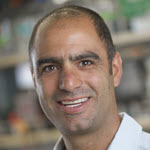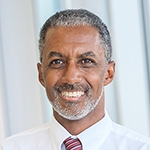NHGRI DIR Seminar Series Archive: 2022-23
Event Details
Note: This is an archive page. However, the Division of Intramural Research (DIR) Seminar Series is ongoing. Go to the current season.
DIR sponsors a monthly series of talks by intramural and special guest speakers celebrating genetics and genomics research. Speakers are selected by NHGRI intramural faculty and trainees and cover research topics of interest to a wide audience.
All seminars are free and open to the public. Seminar titles and other details are updated as information becomes available.
Virtual and In-Person
Recorded Videos
YouTube Playlist: 2022-23 DIR Seminar Series Videos
Seminars
Genetic conflicts during meiosis shape the rapid evolution of essential chromatin proteins
June 22, 2023, 2:00 - 3:00 p.m. EDT

Harmit Malik, Ph.D.
Professor and Associate Director, Basic Sciences Division, Fred Hutchinson Cancer Center
Investigator, Basic Sciences & HHMI Investigator
Fred Hutchinson Cancer Center
Speaker Biography: Dr. Malik studies genetic conflict between genes and proteins with opposing functions that drives evolutionary change, with implications for a range of diseases. He also studies the evolutionary processes that drive our body’s interactions with viruses, including contemporary diseases as well as ancient viruses whose fossils litter our genome. With colleagues, he has characterized the rapidly evolving interface between proteins on human cells and viruses that make us sick. This work has highlighted surprising deviations from “textbook” models of these interactions, and it is revealing gene variants that could influence our susceptibility to infection.
Hosts: Meru Sadhu, Michael Chambers and Sophie Scobell
May 4, 2023, 2:00 - 3:00 p.m. EDT

Rasmus Nielsen, Ph.D.
Professor of Computational Biology
Departments of Integrative Biology and Statistics
University of California at Berkeley
Speaker Biography: Dr. Nielsen studies statistical and population genetic analyses of genomic data, methods for detecting natural selection, describing population genetic variation, inferring demography, and association mapping. His current research concerns statistical analysis of next-generation sequencing data in medical and population genetics. Many of the methods he has developed are heavily used by other researchers, including phylogeny-based methods for detecting positive selection implemented in PAML, methods for inferring demographic histories implemented in the IM and IMa programs, the method for detecting selective sweeps in SweepFinder, and methods for analysing Next Generation Sequencing data implemented in ANGSD. He is particularly interested in the molecular basis of evolutionary adaptation.
Hosts: Drs. Shawn Burgess and Javan Okendo
Variation in the non-coding genome and human phenotypes
April 20, 2023, 2:00 - 3:00 p.m. EDT

John M. Greally, Ph.D., DMed, FACMG
Professor of Genetics and Pediatrics
Albert Einstein College of Medicine
Attending Physician, Montefiore Medical Center
Speaker Biography: Research in the Greally lab is based on understanding models of genetic susceptibility to human disease, especially those affecting children. We focus on understanding phenotypes through genetic or environmental influences that change the innate properties of a canonical cell type, or perturbations that alter cell lineage choices during differentiation. We define this field as somatic cellular genomics, involving the study of the normal physiology of transcriptional regulation in mammalian cells, and mosaic somatic mutations. Our basic research involves the study of the effects of environmental and genetic influences on stem cell differentiation, with a focus on liver and blood diseases. We focus on stem cell systems to understand mechanisms of cellular memory, and to reveal the functional variants in the non-coding majority of the human genome.
Hosts: Andy Baxevanis and Sofia de Pereira Barreira
Population genomics and the evolution of virulence traits in Cryptococcus neoformans
March 23, 2023, 2:00 - 3:00 p.m. EDT

Christina Cuomo, Ph.D.
Group Leader, Fungal Genomics Group
Associate Director, Genomic Center for Infectious Diseases
Broad Institute of MIT and Harvard
Speaker Biography: Dr. Cuomo’s group uses genomic methods to characterize the evolution of fungal pathogens. Studying species across the fungal kingdom, her work has led to major insights into the unique features of pathogenic species, how genomes evolve, variation with pathogen populations, antifungal drug resistance, and genes involved in host interaction. Her current focus is genomic analysis of major human fungal pathogens, to better understand the genetic basis of pathogenicity and drug resistance.
Hosts: Drs. Julie Segre and Diana Proctor
Understanding genetic variants: from technology development to the clinic
February 23, 2023, 2:00 - 3:00 p.m. EDT

Douglas M. Fowler, Ph.D.
Associate Professor
Department of Genome Sciences
University of Washington
Speaker Biography: The Fowler lab is interested in how mutations impact protein function. Protein-coding mutations are important because they underlie many diseases (e.g. cancer).. Furthermore, studying the consequences of mutagenesis can reveal biochemical properties of proteins. Finally, point mutations are the smallest unit of change in protein sequence during evolution. Recently, we developed deep mutational scanning, a method that uses high-throughput DNA sequencing to characterize the functional consequences of large numbers (10^5-10^6) of mutations in a protein simultaneously. Currently, we are using deep mutational scanning to establish a large-scale genotype-phenotype map for cancer related proteins and to study protein aggregation.
Hosts: Meru Sadhu and Michael Chambers
Mechanisms of CRISPR-mediated immunity and applications beyond editing
January 5, 2023, 2:00 - 3:00 p.m. EDT

Blake Wiedenheft, Ph.D.
Professor, Microbiology and Immunology; Biotechnology
Montana State University
Speaker Biography: Viruses that infect bacteria (i.e., bacteriophages) are the most abundant biological entities on earth, and the selective pressures that these pervasive predators impose have a profound impact on the composition and behavior of microbial communities in every ecological setting. Work in the Wiedenheft laboratory aims to understand the mechanisms that bacteria use to defend themselves from phage infection and counter mechanisms that phages use to subvert bacterial immune systems. We aim to determine the molecular structures of the cellular machines that mediate bacterial immunity, and we aim to use these structures to understand function. The scientific culture in the Wiedenheft lab is to understand and engineer cellular machines with new functions for applications in biotechnology and medicine.
Hosts: Julie Segre and Amanda Fuchs
Phylomapping: the use of nature’s experiments to understand the genetic regulation of diversity, development and disease
December 15, 2022, 2:00 - 3:00 p.m. EDT

Matthew Harris, Ph.D.
Associate Professor of Genetics
Harvard Medical School
Speaker Biography: My research leverages forward genetic as well as genomic approaches to understand developmental processes that potentiate growth and patterning in late development. My lab’s work combines analysis of mutants identified in zebrafish and comparative genomics in a broad expanse of other fishes exhibiting unique phenotypes. These approaches have proven to be powerful in modeling developmental and genetic causes of both evolutionary change and human skeletal disorders. Our work has provided a foundation for the use of fish as experimental models and comparative genomics to understand the genetic regulation of development and disease. Current research program focuses on the regulation of proportional growth, bioelectric regulation of development and regeneration, as well as stem cell maintenance in aging.
Hosts: Shawn Burgess and Luis Colon-Cruz
Video Follow @fishyskeleton on TwitterAncestry and diseases in Latin American populations
November 3, 2022, 2:00 - 3:00 p.m. EDT

Eduardo Tarazona-Santos, Ph.D.
Professor, Department of Genetics, Ecology and Evolution
Institute of Biological Sciences
Federal University of Minas Gerais
Brazil
Speaker Biography: My research focuses on the genetics of Indigenous and admixed Latin American populations. I lead the Laboratory of Human Genetic Diversity at the Federal University of Minas Gerais, which focuses on three areas: (i) the role of genomic diversity of Indigenous and admixed Latin American populations in the genetic architecture of complex diseases and drug response; (ii) inferences about the Pre-Columbian demographic history of Native American populations and the dynamics of Post-Columbian admixture in the Americas using genetic data; and (iii) the development of new concepts and tools in computational biology to study human genetic diversity. We are involved in the EPIGEN-Brazil Project, a major initiative at the interface of human genomics, epidemiology of complex diseases, and computational biology. I also lead the genomics and bioinformatics aspect of a project with a cohort of over 10,000 elderly Brazilian individuals. Recently, my group has initiated the Mosaico Translational Genomics project, which uses a transdisciplinary approach to integrate concepts of computational biology, genomics, medicine, and public health in global precision and evidence-based medicine.
Hosts: Charles Rotimi and Mateus Gouveia
The Biology of Health Disparities: Ancestry-Driven Drug Discovery
October 6, 2022, 2:00 - 3:00 p.m. EDT

K. Sean Kimbro, Ph.D.
Professor, Department of Biomedical and Biological Sciences
Director, Integrated Bioscience Ph.D. Program
JLC Biomedical Biotechnology Research Institute
North Carolina Central University
Hosts: Shawn Burgess and Ariel Williams
* Co-hosted by the Genomics and Health Disparities Lecture Series
Last updated: January 5, 2024
